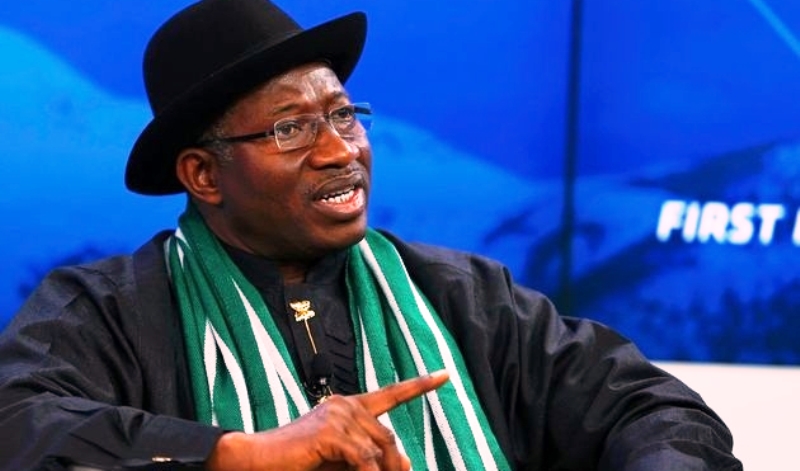Headline
I make sure Nigeria is united before 2015 elections – Jonathan

Former president Goodluck Jonathan on Friday said his convening of a National Conference in 2014 was a major factor that doused tensions across Nigeria prior to and after the general elections one year later.
Mr. Jonathan said this while giving his remarks at the opening panel of the Dialogue of Civilisations, ‘Multipolarity and Dialogue in Regional and Global Developments,’ Rhodes Forum’s 15th Anniversary Summit in Greece.
“When I was in office as President, I championed the cause for good governance, transparent elections and peaceful power transfers, because I also believed that at the heart of the dialogue for a more peaceful world, is the need to cultivate a culture of democracy and good governance at the national levels. This is a good way to reduce local tensions that could blossom into global crisis,” said Mr. Jonathan, who was the lead discussant.
Other members of the panel were former French Prime Minister, Dominique de Villepin; former President of Mali, Dioncounda Traore; Professor of Globalisation, Ian Goldin; and President of Infowatch Group, Natalya Kaspersky.
Mr. Jonathan said dialogue is an essential tool in preventing or resolving communal conflicts.
“In Nigeria, through a process of dialogue, we arrived at an amnesty programme that brought an end to the crisis in the Niger Delta, an oil-rich region in my country that accounts for all the oil wells that remain the mainstay of Nigeria’s economy.
“Sometime in 2014, I had a thought in my mind. Nigeria is easily the most ethnically and religiously heterogeneous society in Africa, and one of the most diverse nations in the world.
“Many times, these different ethnic groups are pulling in diverse directions that as a leader, you may experience genuine fears that the centre may not hold.
“At that time, I asked myself, how can I as President, help build a more harmonious union in Nigeria. One based on the words of our National Anthem which ends with ‘to build a nation where peace and justice shall reign’.
“To address this I convened a National Conference where the various ethnic groups and other stakeholders deliberated for five months on the future of the country. They had the mandate to discuss and advise the Government on all matters pertaining to our nationhood, except the sovereignty of the country.
“On Thursday August 21, 2014, I received the report. Our general elections came up six months after the national conference. The confidence and national goodwill the conference inspired, helped bring down the tension during and after the general elections. It was a confidence-boosting outcome, despite the predictions by some international bodies that Nigeria was going to disintegrate in 2015.
“There is one important point people often overlook whenever the issue of global peace arises. There can be no peace at the global level if there is no peace in the heart, conscience and character of leaders of nations.”
Making a case for the reform and democratisation of the United Nations in order to make it more representative and responsive to the security challenges, the former president called on the body to change its method of dialogue.
“The present situation where one nation, out of 193 nations, can upturn the decision of the Security Council, has not been helpful in galvanising the confidence and mutuality, necessary to bring peace to the world,” Mr. Jonathan said.
“If anything, the system, which has remained unreviewed in over half a century, has been more effective in opening new frontiers for conflicts, rather than providing answers to the ones it sought to resolve.
“The Security Council of the United Nations must be democratised, in view of new global realities, in the interest of peace. As presently constituted, the UN is portrayed as a platform where nations come to quarrel and display their might, instead of its statutory role, as a forum for unity and world peace.”
Mr. Jonathan said for the world to experience sustainable peace, effective leadership must come from the UN.
“The UN that would inspire this kind of leadership should ensure equity, with leading nations and power centres representing different regions of the world, sitting at the Security Council as permanent members.
“In Africa, the restructuring of the Organisation of African Unity (OAU) to African Union (AU), coupled with the formation of the regional blocks such as the Common Market for Eastern and Southern Africa (COMESA), ECOWAS and SADCC has helped reduce conflicts significantly. This has given the continent a glimmer of hope in the way it applies dialogue as an instrument of regional peace and development.
“In West Africa where I come from, ECOWAS and my nation Nigeria has resolved, as well as prevented, many conflicts and stabilised and strengthened democracy in many countries in the sub-region. Some of the countries we were able to stabilise are Liberia, Sierra Leone, Niger, Cote D’Ivoire, Mali, Guinea Bissau, Burkina Faso and The Gambia. We were able to achieve this because of intense and purposeful dialogue.
“In ECOWAS, we have not only adopted dialogue as a productive means of resolving political conflicts and violence, but have also moved many steps towards economic integration. I believe that successes have been recorded in this regard with the policy on free movement of persons and goods, similar to what obtains within the EU countries. We were able to achieve all these through a process of sincere dialogue.”
PREMIUM TIMES




 Davido's Net Worth & Lifestyle
Davido's Net Worth & Lifestyle 
